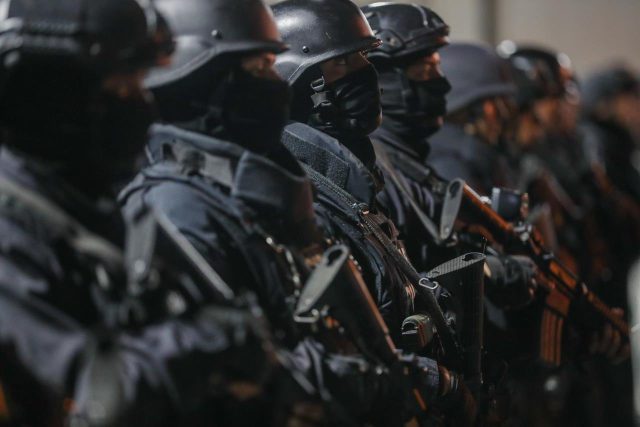Explosions, fires, shootings, murders, prison riots and a wave of attacks have unleashed terror in several cities in Ecuador. Until now, the authorities blame the events on «drug-criminal» groups.
The acts of violence, which have so far left five policemen dead and several people injured, have intensified since the beginning of the week in the provinces of Guayas, Esmeraldas and Santo Domingo de los Tsáchilas, all located at strategic points for the drug trafficking business and arms smuggling, informs RT.
From Guayas, in the southwest of the country, organized crime has access to distribute drugs and weapons across the Pacific to Central America, the US and the South American cone. In Esmeraldas, in northwestern Ecuador, they have a port to Colombia, Central and North America; while in Santo Domingo de los Tsáchilas, in the center of the country, there is a passage to the interior of Ecuador and its capital, Quito.
The response of the Government of Guillermo Lasso has been to decree a state of emergency regime in the three provinces, which is accompanied by a curfew between 9:00 pm and 5:00 am in the morning. The measure began to take effect on Tuesday in Guayas and Esmeraldas, and on Friday it was added to Santo Domingo de los Tsáchilas, after attacks with car bombs were registered near gas stations.
«It is something that happens for the first time in the history of the Republic of Ecuador, the drug mafias are trying to take over the Ecuadorian State», lamented Lasso, who pointed to «transnational organized crime» as responsible for the «acts of sabotage and terrorism» which, for his Government, are «a declaration of open war».
To confront this «war» unleashed with more than 18 terrorist attacks against police headquarters, civilian objects and a health center, Lasso installed a unified command post to direct the contingency and activated 1,400 soldiers from the Armed Forces and the National Police to stop organized crime.Raids in Ecuador
Since the state of emergency was decreed, the security forces have carried out a series of raids in the conflict zones, including prisons. The objective is to find the leaders of the criminal groups that operate from prison, as well as other criminals linked to crime.
In the middle of last week, Lasso reported that with the security procedures, more than 50 people had already been captured, presumably linked to different criminal acts. In addition, the authorities have reported the seizure of batches of short and long firearms, drugs, ammunition and explosives.
One of the most tense situations took place in the Litoral Penitentiary, in Guayas, one of the most violent in the country, where —since last Tuesday night— a riot occurred that lasted until Thursday afternoon, and it left 12 wounded soldiers after two days of confrontations against inmates, who refused to be searched by the security forces.
After taking control of the prison, the Armed Forces have maintained an intense patrol in the peripheral area, including the Daule River, near the penitentiary.
Meanwhile, the Government assures that it has managed to regain control of the prison centers in which the authorities have intervened to «end» the «crime headquarters» installed in those places of detention.
«They are running out of friends or levers, and they intend to sow fear (…) drug criminals who know that our hands will not shake (in the face of this situation)», settled the president, who decided to suspend the vacations he had planned in the US.Allies of the Mexican cartels?
The wave of violence began after the National Service for Comprehensive Care for Adults Deprived of Liberty and Adolescent Offenders (SNAI) began to transfer prisoners to different penitentiary centers, with the argument of reducing overcrowding, improving infrastructure and security conditions.
These transfers would have worried the criminal groups, according to the Government, because they implied breaking the control the leaders of the criminal activity exercised from the penitentiary centers.
After the events, pamphlets began to circulate in Ecuador, which went viral on networks, where the Jalisco New Generation Cartel (CJNG) allegedly threatened the Lasso Government.
The CJNG warned that if they touched their «people» inside pavilions 8 and 9 of the Litoral Penitentiary (Penitenciaría del Litoral), they would use all their logistical power, military weapons and troops to unleash armed violence.
In that same text, they accused the director of the SNAI, Guillermo Rodríguez, of allegedly being related to «Fito and Huevo», leaders of ‘Los Choneros’, a criminal group that would be associated with their rivals from the Sinaloa Cartel. In addition, they warned that they would carry out more attacks against all kinds of civilian and State targets.
According to the Mexican press, ‘Los Choneros’ are known as the largest drug gang in Ecuador and would be in charge of transporting the cocaine of the Sinaloa Cartel.
For its part, the CJNG would have been associated with the gangs of ‘Los Lobos’, ‘Los Tiguerones’, ‘Los Chone Killers’, and ‘Latin Kings’, according to reports in the Ecuadorian press. This ‘society’ would have started in 2021, through the criminal organization «Cartel Nueva Generación», to try to control the drug corridors in the Andean country.
However, last May, these same four criminal gangs announced that they would take a first step towards voluntary pacification, but then, in October, the headquarters of the RTS television station, north of Guayaquil, was attacked and pamphlets were thrown on the street against the newspaper La Extra, signed by ‘La Nueva Generación’.
In the pamphlets, they threatened to kill the newspaper vendors and distribution agencies that put the newspaper into circulation. Similarly, they promised to «kill» (muerte) the national director of that medium for «bad reporting».
At the moment, the Lasso government has not confirmed the versions of the alleged links that the Mexican cartels would have with the Ecuadorian criminal gangs, although they do consider that it is «transnational organized crime».


